
World
17:32, 03-Apr-2019
Trump isolated in Washington over criticisms of NATO
By John Goodrich
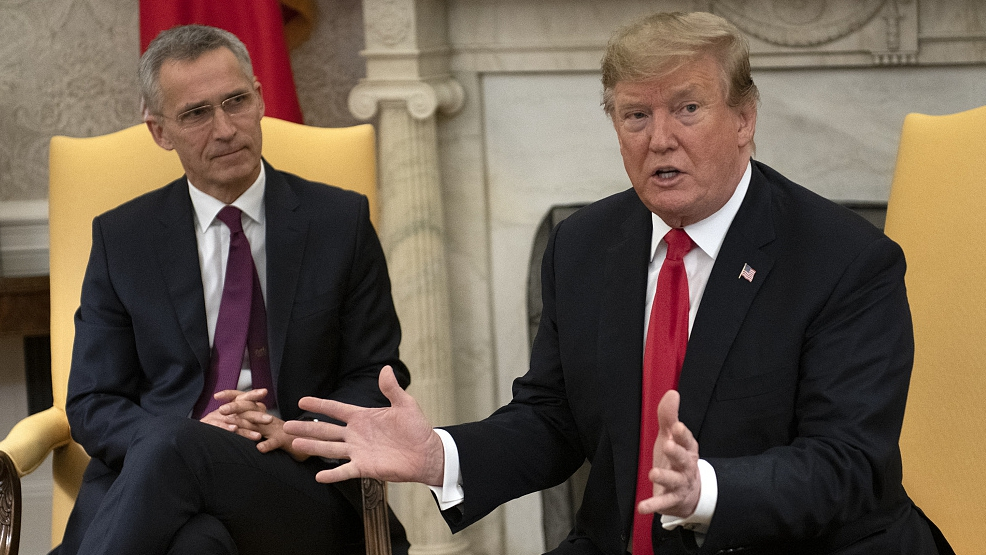
The Republican Party is often now said to belong to Trump, that its traditions have been consumed. Yet, on some issues, the party's representatives and its president diverge.
One such issue is the North Atlantic Treaty Organization, the alliance which marks its 70th anniversary this week.
The split between Trump and Republican lawmakers will be the backdrop as Jens Stoltenberg becomes the first NATO secretary general to address a joint session of the U.S. Congress on Wednesday.
Read more:
Since Trump's election, the transatlantic relationship has been strained – on security as well as climate and trade. There have been spats, threats and murmurings of a break up.
Senior administration officials told the New York Times in January 2019 that the U.S. president has repeatedly suggested withdrawing from NATO. The officials said Trump argued he did not see the purpose of the alliance and that it was a drain on the resources of the United States.
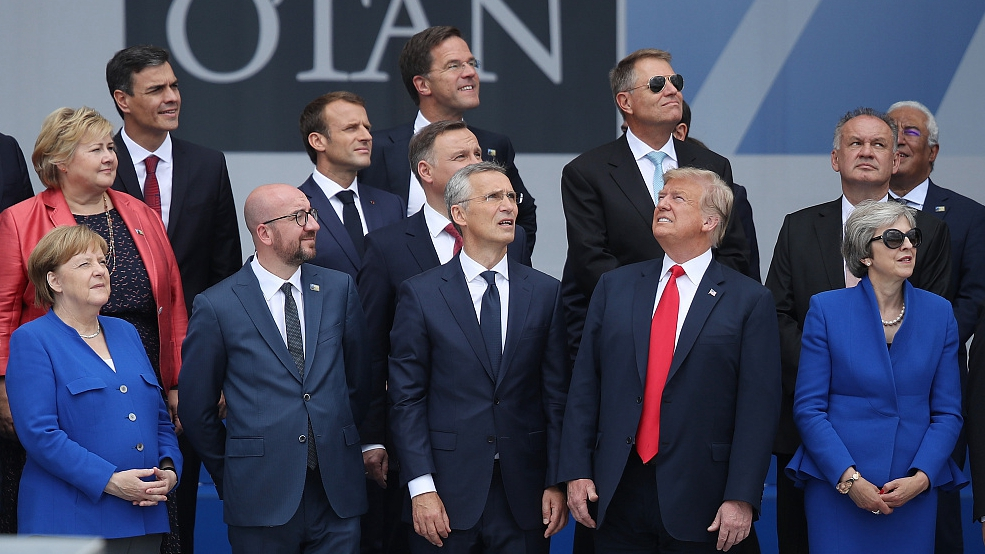
The opening ceremony of the 2018 NATO Summit in Brussels, Belgium, July 11, 2018. /VCG Photo
The opening ceremony of the 2018 NATO Summit in Brussels, Belgium, July 11, 2018. /VCG Photo
It is a key question of the Trump presidency: Can "America First" engage with multilateral organizations? In the case of the Paris climate accords and the Iran nuclear deal, the answer has been a resounding "no."
But on NATO, the response within the U.S. establishment has been different. While Trump has prevaricated, Congress has voted in near unanimous support.
The Senate in 2018 passed a resolution by a 97-2 margin in support of NATO, and the House of Representatives voted unanimously in support. The newly-elected House voted 357-22 in January 2019 in favor of legislation backing the alliance and preventing federal funds from being used to leave it.
"There is virtually no support – in his own administration, among the American public, or in Congress – for taking a wrecking ball to NATO," Charles Kupchan, a senior fellow at the Council on Foreign Relations, wrote in an Foreign Affairs article in March.
Trump hasn't tried to hide his reservations, despite his isolation in Washington.
Distrust of the organization was one of the themes of the 2016 presidential campaign, during which candidate Trump described NATO as "obsolete." And at rocky NATO summits in 2017 and 2018, he did not endorse the policy of collective defense and hit out at other members' spending.
A Trump-Stoltenberg meeting was only put on the schedule this week after Democratic Speaker Nancy Pelosi and Senate Majority Leader Mitch McConnell, who has described NATO as "the most important military alliance in world history," invited the NATO chief to address Congress.
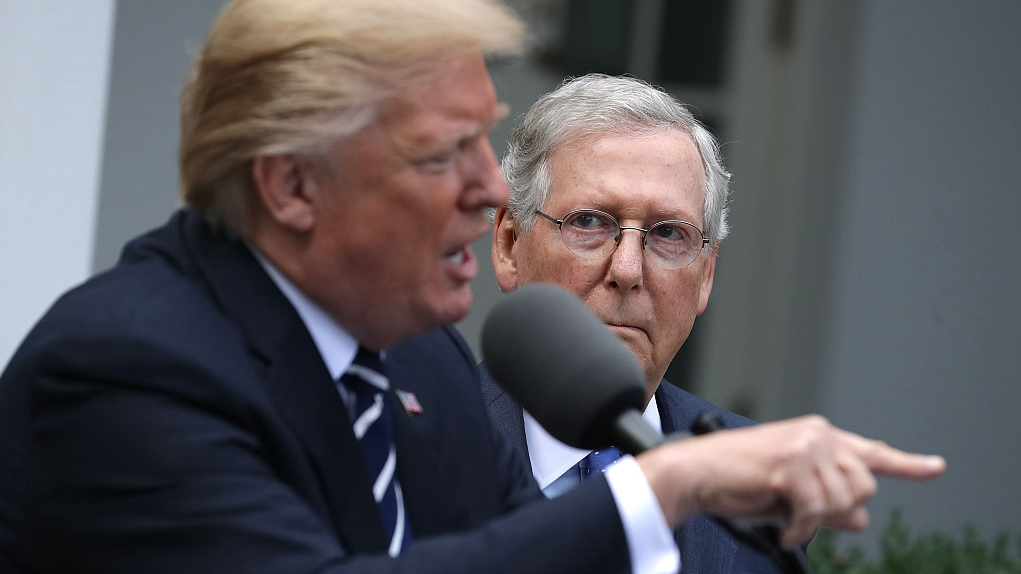
President Donald Trump and Senate Majority Leader Mitch McConnell talk to reporters at the White House, Washington, DC, October 16, 2017. /VCG Photo
President Donald Trump and Senate Majority Leader Mitch McConnell talk to reporters at the White House, Washington, DC, October 16, 2017. /VCG Photo
The president is not involved in the 70th anniversary events in Washington, the official meeting was downgraded to a foreign ministers' gathering, and a low-key leaders' summit is now scheduled for December in London.
"The whole thing is really weird,” Thomas Wright, director of the Center on the United States and Europe at the Brookings Institution, told the Financial Times.
“They're not including the president of the U.S. because they're frightened of him and they're trying to act like everything is normal, but it's not."
On Tuesday, sitting with Stoltenberg at the White House, Trump focused on the issue of money – specifically, his belief that other members of the 29-strong bloc don't pull their weight.
"When I came, it wasn't so good, and now they're catching up," Trump claimed, adding that the two percent of GDP defense spending per country target "may have to go up."
The issue of "burden sharing" is likely to crop up regularly over the remainder of the Trump presidency, with a proposal known as "Cost Plus 50" reported to have caught the president's ear.
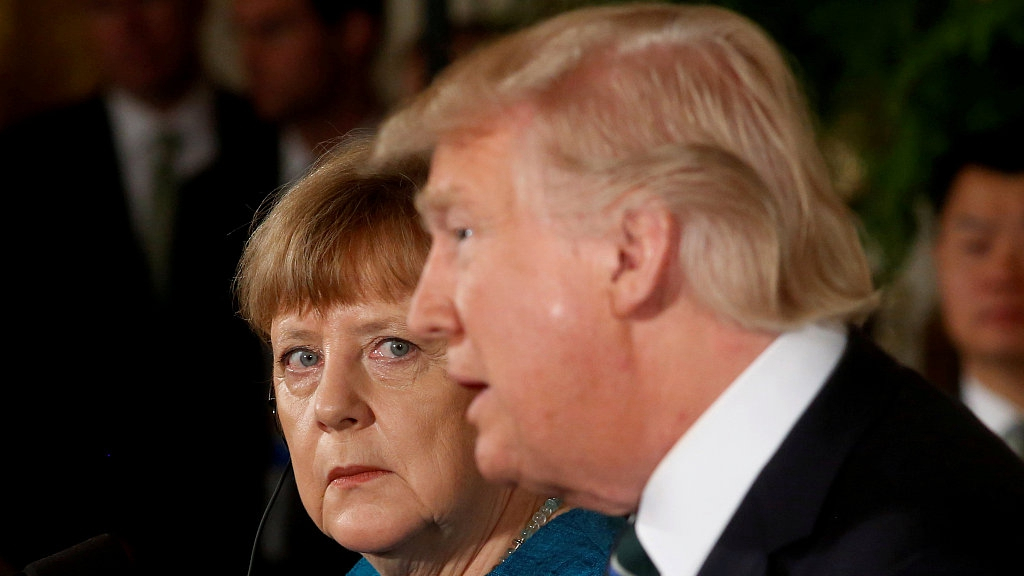
Germany's Chancellor Angela Merkel and U.S. President Donald Trump hold a joint news conference in the White House in Washington, DC, March 17, 2017. /VCG Photo
Germany's Chancellor Angela Merkel and U.S. President Donald Trump hold a joint news conference in the White House in Washington, DC, March 17, 2017. /VCG Photo
It would require host countries to pay the full cost of American bases on their soil, plus a 50 percent premium. This would have serious repercussions for NATO in countries like Germany, whose defense spending Trump again hit out at on Tuesday.
"Germany honestly is not paying their fair share,” he said. “They're not paying what they should be paying. They're paying close to one percent.” The European country is budgeting to spend 1.35 percent of GDP on defense in 2019 and 1.37 percent in 2020.
Stoltenberg, whose term as NATO chief was last week extended by two years, appears to have hit upon a diplomatic tactic to maintain an uneasy peace in the alliance: Allow Trump to claim victory on spending and praise him repeatedly.
The two percent target was actually formalized in 2014, during the Obama presidency. Kupchan added, "If letting Trump take credit for convincing Europeans to invest more in defense improves his view of the alliance, then let's by all means indulge him."
Stoltenberg, a former Norwegian prime minister who reportedly brought charts to the White House to prove to Trump that defense spending of members had risen, insisted the president was "having a real impact" and that "allies are now really stepping up."
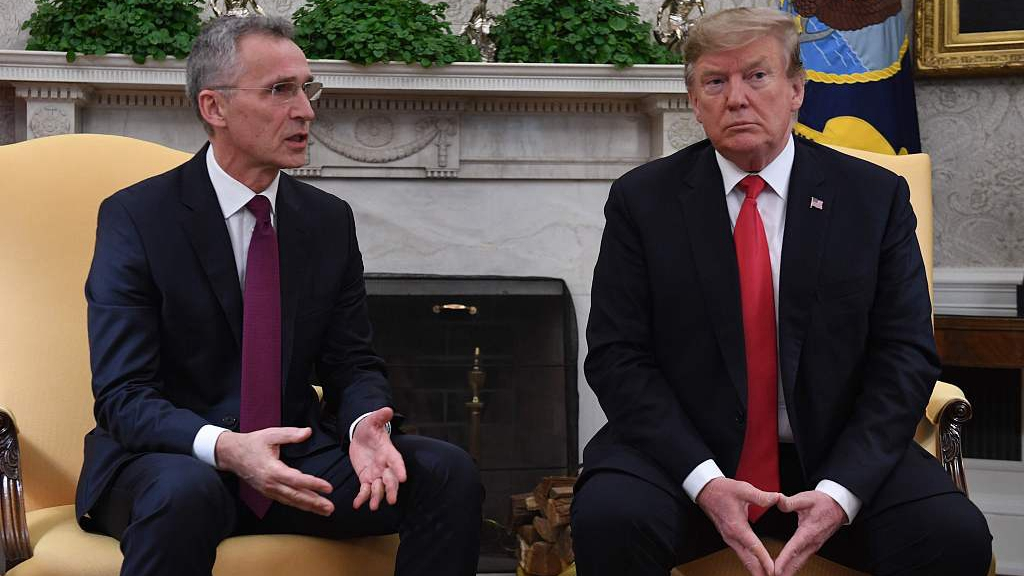
US President Donald Trump looks on as NATO Secretary General Jens Stoltenberg speaks at the White House in Washington, DC, April 2, 2019. /VCG Photo
US President Donald Trump looks on as NATO Secretary General Jens Stoltenberg speaks at the White House in Washington, DC, April 2, 2019. /VCG Photo
The extent to which that approach is papering over the cracks is debatable, though Kupchan argues that ultimately "Trump's withering attacks on the alliance are actually strengthening NATO. Defenders of the alliance are coming out of the woodwork, especially in the U.S. Congress."
Congress has been willing to buck Trump on foreign policy over the past two years, and former U.S. ambassadors to NATO Nicholas Burns and Douglas Lute have called for it to act as a bipartisan "blocking force against President Trump's dangerous policies" in a report for the Belfer Center.
Recent votes in Congress are clear in support of NATO, but Burns and Lute argue that the greatest challenge for NATO is "the absence of strong, principled American presidential leadership for the first time in its history."
And public opinion appears more in tune with the president than lawmakers. An Ipsos poll in July 2018 found that 49 percent of Americans believed the U.S. should not have to uphold its treaty commitments if NATO allies do not spend more on defense.

SITEMAP
Copyright © 2018 CGTN. Beijing ICP prepared NO.16065310-3
Copyright © 2018 CGTN. Beijing ICP prepared NO.16065310-3